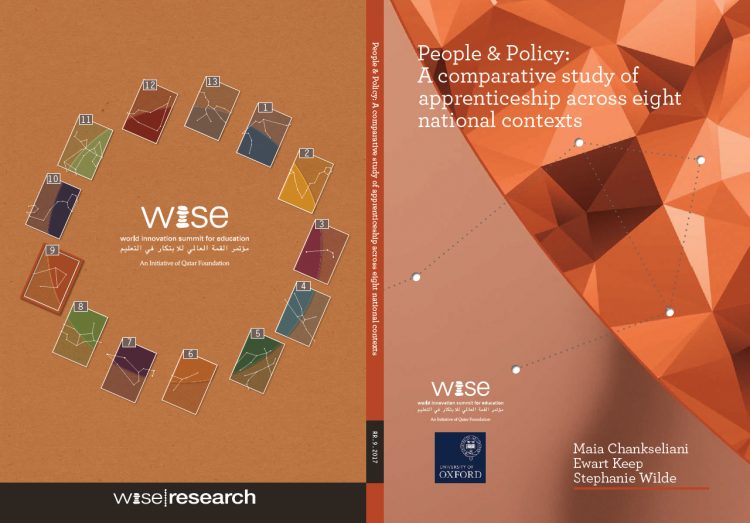Government apprenticeship schemes ‘fragile’, according to new research
18 Oct 2017

Dr Maia Chankseliani, Associate Professor of Comparative and International Education and Fellow at St Edmund Hall, is the lead author of a new Oxford/WISE (World Innovation Summit for Education) report which compares, for the first time, participation in apprenticeship globally.
The study concludes that despite a growing political interest in apprenticeship worldwide, it remains a relatively fragile mode of vocational education and training. One significant reason given for this is that its reliance on the active participation and support of employers makes it more vulnerable than forms of learning that are classroom-based and which can be delivered by state-sponsored colleges acting without direct employer support. For the model to work and produce successful, qualified apprentices, employer engagement is crucial, suggest the authors. Therefore, having strong incentives for employers to participate in programme provision is vital.
“The policy purpose of apprenticeships is not always clear,” explained Maia. “There are economic and social purposes of apprenticeship and there is a potential for tension among policy-makers between wanting apprenticeship to be viewed by employers and wider society as a rigorous, high status route, and also wanting to use it to support social inclusion for those who have not thrived on the academic route and within mainstream schooling. This tension about apprenticeship purpose can be problematic because it may impede the formation of realistic expectations about an apprenticeship system.”
Maia Chankseliani, together with fellow researchers from Oxford University’s Department of Education, Ewart Keep and Stephanie Wilde, conducted the study in collaboration with the World Innovation Summit for Education, and assessed apprenticeships by order of participation level in eight countries: Australia, Denmark, Egypt, England, Finland, Germany, India and South Africa.
The study assesses participation levels by looking at the number of apprentices employed per 1,000 staff. This uptake ranges from 47 in Denmark, which has the highest level of engagement, to five in South Africa, and as little as one in both Egypt and India. England and Germany have 32 and 31 apprentices per 1,000 staff respectively, while Australia has 22 and Finland 18.
Apprenticeship schemes vary widely across countries in all areas of management, from how they are organised and financed, to the day to day running and learning style of the programmes offered. In some countries, apprenticeships have come to be used as a route for giving less academically minded young people a second chance in life, which the authors find to be increasingly unrealistic.
The varying degrees of international participation suggest that there is still grey area in some countries around how to make the most of the apprenticeship model. Apprenticeship incentives are more appreciated in regions where employer associations are historically stronger, for example in Denmark and Germany.
For employers in some regions, such as Egypt, apprenticeships are seen to have as many disincentives as they do incentives. A big concern is around employee retention: why invest in someone when they might leave and go elsewhere?
In other countries, including England and Australia, a policy discourse has developed where the apprenticeship has come to be perceived as a form of ‘magic dust’, which can be sprinkled on almost any vocational education and training problem, and offered to any young person who wants one.
In Finland, apprenticeships have been assigned a niche role focused largely on second chance, social inclusion objectives, with little attempt to see it as a broader, high quality route for large volumes of initial vocational education and training. In England, by contrast, there has been a tendency to try to pursue social inclusion and high status objectives simultaneously, with the overall result that to some extent neither outcome has been realised.
When the New Labour governments in the UK expanded apprenticeship provision, it was positioned as a relatively high status option for those seeking intermediate and technician level training and offered with an “apprenticeship guarantee”. This guarantee proved impossible to deliver, as the volume of apprenticeship places was (and still is) determined by the willingness of employers to provide them, rather than by individual demand from young people, and the guarantee was quietly abandoned.
In order to improve apprenticeship engagement in countries where the model has been less successful, the authors suggest that it is in the government’s interest to work with industry to better incentivise this investment and make the benefits of the approach more explicit.
Dr Asmaa Al Fadala, Director of Research and Content Development, World Innovation Summit for Education (WISE), said: “An apprenticeship is a valuable pathway in its own right. Not only does it give learners a wage and financial independence, it provides individuals with the skills and knowledge to succeed in vocations they are passionate about. But, a successful apprenticeship requires the effort and enthusiasm of both the employer and apprentice. This new WISE/Oxford report is an effort to guide policymakers and companies with a truly global perspective on the apprenticeship debate, which is often very nationally focused.”
Dr Maia Chankseliani will participate in the upcoming World Innovation Summit for Education that takes place in Doha, Qatar on 14-16 November, 2017.
Categories
Related News

Teddy Hall’s Professor Carly Howett’s Research Suggests Saturn’s Icy Moon May Host Life
10 Nov 2025
